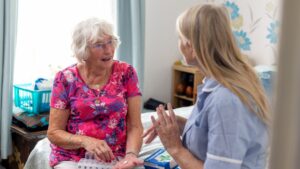As seniors age, staying informed about their health becomes increasingly important for maintaining their well-being and independence. Skilled nursing facilities (SNFs) play a critical role in providing comprehensive care, including health education programs that empower seniors with knowledge and skills to take control of their health. In this article, we will explore the various types of health education programs offered at SNFs and how they contribute to promoting independence among seniors.
Importance of Health Education for Seniors
Health education is a crucial component of senior care as it helps residents understand their health conditions, medications, and lifestyle choices. It equips them with the knowledge and skills necessary to make informed decisions about their health and empowers them to actively participate in their care. Health education programs also promote self-management of chronic conditions, prevent complications, and reduce hospitalizations, leading to improved overall health outcomes.
Types of Health Education Programs Offered at SNFs
SNFs offer a wide range of health education programs tailored to the specific needs and preferences of their residents. Some of the common types of health education programs offered at SNFs include:
- Chronic disease management: Many seniors have chronic conditions such as diabetes, hypertension, or heart disease. Health education programs at SNFs provide information about these conditions, their causes, symptoms, and management strategies. Residents learn about healthy lifestyle choices, medication management, self-monitoring, and symptom recognition to effectively manage their chronic conditions and prevent complications.
- Fall prevention: Falls are a leading cause of injuries among seniors. Health education programs at SNFs include fall prevention strategies such as home safety assessments, balance exercises, and proper use of assistive devices like walkers or canes. Residents learn about risk factors for falls, how to prevent falls, and what to do in case of a fall to reduce the risk of injuries and maintain their independence.
- Medication management: Seniors often take multiple medications, which can be confusing and increase the risk of medication errors. Health education programs at SNFs educate residents about their medications, including the proper dosage, timing, and potential side effects. Residents learn how to organize their medications, use pill organizers, and communicate effectively with their healthcare providers to ensure safe and effective medication management.
- Nutrition and healthy eating: Proper nutrition is essential for seniors’ overall health and well-being. Health education programs at SNFs provide information about healthy eating habits, meal planning, and the importance of a balanced diet. Residents learn about specific dietary requirements for their health conditions and how to make healthy food choices to maintain their energy levels, manage chronic conditions, and promote optimal health.
- Exercise and physical activity: Regular physical activity is crucial for seniors’ physical health, mobility, and independence. Health education programs at SNFs provide information about the importance of exercise, types of physical activities suitable for seniors, and how to safely engage in exercise routines. Residents learn about the benefits of regular physical activity, such as improved strength, flexibility, balance, and cardiovascular health, and how it contributes to their overall well-being.
- Health screenings and preventive care: Early detection and prevention of health issues are vital for seniors’ well-being. Health education programs at SNFs provide information about the importance of health screenings, such as mammograms, colonoscopies, and vaccinations, and encourage residents to proactively engage in preventive care. Residents learn about the recommended screenings for their age group, how to schedule appointments, and the benefits of preventive care in maintaining their health and independence.
Health education programs offered at skilled nursing facilities play a vital role in empowering seniors to take control of their health and promoting their independence. By providing information, skills, and strategies for self-management, these programs help seniors make informed decisions about their health conditions, medications, lifestyle choices, and preventive care. From chronic disease management to fall prevention, medication management, nutrition, exercise, and health screenings, these programs offer a comprehensive approach to promoting seniors’ health and well-being.
Through health education programs, seniors gain knowledge and skills to effectively manage their chronic conditions, prevent falls, properly manage their medications, make healthy food choices, engage in regular physical activity, and proactively participate in preventive care. These programs empower seniors to take an active role in their own health, enhancing their independence and overall quality of life.
In conclusion, health education programs offered at skilled nursing facilities are invaluable in empowering seniors to make informed decisions about their health and well-being. By providing education, skills, and strategies to manage their health conditions and prevent complications, these programs promote independence among seniors and enable them to live a healthier and more fulfilling life. Seniors and their families can trust in the expertise and support provided by skilled nursing facilities’ health education programs to help them achieve optimal health outcomes in their golden years.

